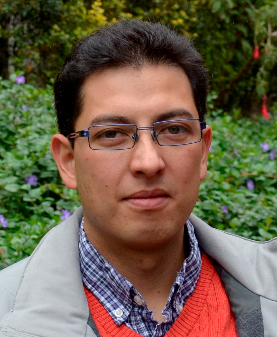Keynote Speakers

Prof. Tom Oomen
Eindhoven University of Technology, The
Netherlands
Speech Title: From data to future high-tech
systems
Abstract: The future of manufacturing equipment and
scientific instruments critically depends on achieving faster and more
precise motion. Examples of such mechatronic systems include wafer
scanners, wire bonders, die bonders, printing systems, pick-and-place
machines, microscopes, and telescopes. These high-tech systems face
continuously increasing demands in terms of speed, accuracy, and
flexibility. At the same time, current design methodologies lead to
excessive cost and are reaching a dead end.
We envisage a new
generation of data-intensive mechatronic designs in which a massive
number of actuators and sensors are deployed throughout the machine. On
a submodule level, performance improvements are achieved through
over-actuation, where active control replaces mechanical stiffness,
resulting in unprecedented motion accuracy. Since the overall system's
goal is to achieve system-level performance, system-level control
problems are investigated, involving synchronized motion control and
multiphysics problems such as thermo-mechanical control.
The
vast amount of data originating from the massive number of actuators and
sensors further enables machines that can learn and adapt during
operation. Self-learning automatically adapts and improves the behavior
of the system while operating. Self-healing machines enable submodules
to dynamically take over tasks from faulty components, thereby
significantly increasing machine uptime and robustness.
These
concepts are demonstrated through several industrial case studies,
illustrating the potential of data-intensive mechatronic design for
future high-tech systems.
Biography: Tom Oomen is a full
professor in the Department of Mechanical Engineering at Eindhoven
University of Technology, The Netherlands. He has also held academic
positions at KTH Royal Institute of Technology (Sweden), The University
of Newcastle (Australia), and Delft University of Technology. He is the
recipient of several awards, including the 7th Grand Nagamori Award, the
Corus Young Talent Graduation Award, and NWO Veni and Vidi personal
grants. He currently serves as Senior Editor of IEEE Control Systems
Letters (L-CSS) and Co-Editor-in-Chief of IFAC Mechatronics. His
research involves the development of advanced motion control solutions
for precision mechatronics, ranging from semiconductor equipment and
printing to space and astronomy.

Prof. Teresa Zielinska
Deputy Director of the Institute of Aeronautics and Applied Mechanics
Warsaw University of Technology, Poland
Biography: Prof. Teresa Zielińska is a Full Professor in Technical Sciences and the Deputy Director of the Institute of Aeronautics and Applied Mechanics at the Warsaw University of Technology (WUT). She graduated from the Faculty of Electronics and Information Technology at WUT (M.Sc.), obtained her Ph.D. from the Faculty of Power and Aeronautical Engineering at WUT, and completed her habilitation at the Institute of Biocybernetics and Biomedical Engineering of the Polish Academy of Sciences.
She is a member and Vice-Chair of the Committee of Automatic Control and Robotics of the Polish Academy of Sciences. She previously served as Vice-Chair of the IEEE Robotics and Automation Section in Poland (2016–2019) and as Secretary General of the International Federation for the Promotion of Mechanism and Machine Science (IFToMM) from 2011 to 2019, an organization uniting over 40 member countries ([http://iftomm.net/](http://iftomm.net/)).
Prof. Zielińska is President of the Indo-European Universities Network HERITAGE (30 universities), which aims to strengthen higher education cooperation—both in research and training—between Europe and India in the field of engineering sciences ([https://heritagenetwork.org/english-version/governance](https://heritagenetwork.org/english-version/governance)). She is also a member of the CHIST-ERA Advisory Board, a European coordination and cooperation activity of national and regional research funding organizations, where she advises on research funding strategies in the area of information technology. From 2019 to 2022, she served as a member of the Council of the National Science Centre (NCN) in Poland.
She is the local coordinator of the international programs European Master on Advanced Robotics (EMARO) and Japan-Europe Master on Advanced Robotics (JEMARO) , and she previously served as a member of the Team of Experts at the Ministry of Science and Higher Education (2017–2018).
Prof. Zielińska has conducted research at several leading universities, including the Polytechnic University of Turin (Italy, under a grant from the Italian Ministry of Education), Loughborough University of Technology (United Kingdom, under a grant from the Science and Engineering Research Council), and Nanyang Technological University (Singapore), where she was employed as a Senior Research Fellow.
She has also been a Visiting Professor at the National University of Singapore , Nanyang Technological University (Singapore), Griffith University (Brisbane, Australia), Keio University (Hiyoshi, Japan), Shanghai Jiao Tong University (China), and Waseda University (Japan). She has collaborated with The Ohio State University (USA) within the framework of the Poland–USA Marie Curie-Skłodowska Fund.
Prof. Zielińska is a co-recipient of two national patents and the author or co-author of over 300 scientific publications. She has received numerous awards, including the Award of the Minister of Higher Education (Poland) for her research monograph, the Gold Cross of Merit , and the Medal of the Commission of National Education , as well as multiple university-level awards for research excellence.
Her research interests focus on robotics, particularly the development of real-time control systems, motion synthesis, and the design of novel robotic systems. She has worked extensively on walking machines, humanoid and mobile robots, and has developed a sensor prototype for measuring shear forces and a control system for teams of autonomous walking machines. Her current research is centered on bio-robotics .
Prof. Zielińska serves on several national and international journal editorial boards and has managed or participated in numerous national, European, and international research grants.

Assoc. Prof. Fredy O. Ruiz P.
Politecnico di Milano,
Italy
Speech Title: Dealing With Uncertainty In
Data-Based Learning: From Parametric Estimation To Black-Box
Optimization
Biography: Prof. Ruiz is an Associate Professor of
Systems and Control at the Department of Electronics, Information and
Bioengineering of Politecnico di Milano. He earned his Bachelor’s (2002)
and Master’s (2005) degrees in Electronics Engineering from Pontificia
Universidad Javeriana in Colombia, and completed his PhD (2009) at
Politecnico di Torino, Italy. He served as Assistant Professor
(2010–2014) and later Associate Professor (2015–2019) at Pontificia
Universidad Javeriana, where he also held the position of Chair of the
Electronics Engineering Department from 2014 to 2016. In 2019, he joined
Politecnico di Milano as a tenured Associate Professor. Prof. Ruiz has
been a visiting scholar at the University of California, Berkeley (2013)
and at Politecnico di Torino (2018). His research focuses on data-driven
methods for system identification, automatic control, and optimization.
He has developed theoretical and computational frameworks for the
analysis, design, and control of dynamical systems with incomplete
information, leveraging data generated by the system itself, with
applications in mechatronics, power electronics, smart grids, and
industrial processes.

Assoc. Prof. Breiffni Fitzgerald
University of Dublin, Ireland
Biography: Dr Breiffni Fitzgerald is an Associate Professor in the Department of Civil, Structural and Environmental Engineering at Trinity College Dublin. He is also a Fellow of Trinity College Dublin. His research is at the forefront of structural dynamics and control, with a primary focus on wind energy systems. He applies methodologies that span from classical dynamic modelling to cutting-edge machine learning, advancing the performance, reliability, and climate resilience of wind energy systems. Dr Fitzgerald has published widely in top-tier journals and serves as an editor of Wind Energy, the leading international journal in the field. Dr Fitzgerald is currently the Director of Postgraduate Teaching and Learning for the School of Engineering. This senior management role involves shaping the postgraduate (PG) experience within the School for PG taught and research students. He leads doctoral education strategy, postgraduate policy development, and student experience initiatives across the School. He was awarded a TCD Teaching Excellence Award in 2023 in recognition of his contributions to research-led teaching and supervision. Dr Fitzgerald is a Chartered Engineer of the Institution of Engineers of Ireland and the American Society of Civil Engineers. He has been recognised with several industry awards, including a nomination for Chartered Engineer of the Year.